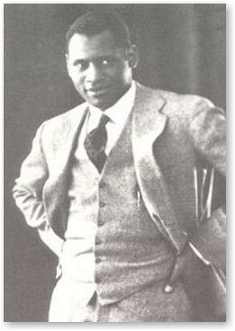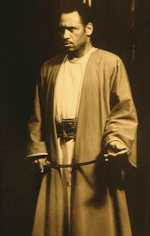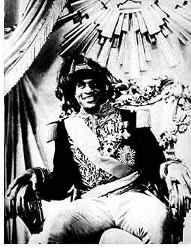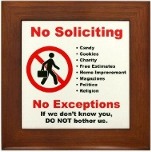|
|
|
 |
|
Paul RobesonThe Price of Free Speech | |
|
"My father was a slave and my people died to build this country and I am going to stay here and have a part in it just like you. And no fascist-minded people will drive me from it. Is that clear?'' Paul Robeson's testimony before the House Un-American Activities Committee. Paul Robeson was a very intelligent, gifted and multitalented man who was never able to reach his full potential because of racial prejudice and his unpopular political beliefs. Robeson fought segregation and injustice, and was a vocal advocate of communism and other left-wing causes. During the McCarthy era of the 1950's, he was persecuted for his political views and his career was destroyed. |
 |
Paul Leroy Bustill Robeson was born in Princeton, New Jersey, in 1898. He was an outstanding student in high school and was awarded an academic scholarship to Rutgers University. While at Rutgers, he excelled in academics, sports and the arts. He graduated with honors and was the class valedictorian. He was a star athlete and earned 12 letters in track, baseball, basketball and football. He was an excellent singer and a fine actor.
After graduating from Rutgers, he studied law at Columbia University and
financed his education by playing professional football. While at
Columbia, he met and married a biology student named Eslanda Cordoza
Goode. "Essie" convinced Paul to appear in an amateur play
that was staged by the Harlem YWCA, where he received rave reviews and
an offer for his first professional acting job; a play by Augustin
Duncan called The Voodoo.
In 1935, he toured the Soviet Union and was very impressed with what he saw as a classless society where all races were treated equally. He wrote, "Here, for the first time in my life, I walk in full human dignity." He believed in the communist ideology and never seemed to see or understand the dark side of the Soviet version of communism. After World War II, the Cold War between the United States and the Soviet Union began, and with it, the witch hunting of the McCarthy era. Demagogues in politics and the entertainment industry created a climate of fear and suspicion that communists were trying to destroy democracy in American from within. People were called before the House Un-American Activities Committee (HUAC), where it was demanded that they answer whether they were a communist or not and if so, to give the names of other communists. Robeson became a target and was called before the committee. He refused to answer whether he was a communist or not, since it was his right as an American. Then he was asked about his trip to the Soviet Union: He replied, "In Russia, I felt for the first time like a full human being -- no color prejudice like in Mississippi, no color prejudice like in Washington.'' Asked by the committee why if he liked it so much he hadn't stayed there, Robeson thundered, "Because my father was a slave and my people died to build this country and I am going to stay here and have a part in it just like you. And no fascist-minded people will drive me from it. Is that clear?''
In 1956, after Khrushchev made the crimes of Soviet leader Josef Stalin public, including; forced famine, genocide and political purges, Robeson suffered an emotional collapse and was hospitalized for depression. He was hospitalized several times over the next few years for depression and exhaustion. His autobiography, Here I Stand, was published in 1958 but was not reviewed by the mainstream press. The book was not widely distributed and few copies were sold. His passport was finally restored that year, but by then his show business career had evaporated.
Paul Robeson fought for justice and equality his entire life, and he paid dearly for having the courage of his convictions. |
|





